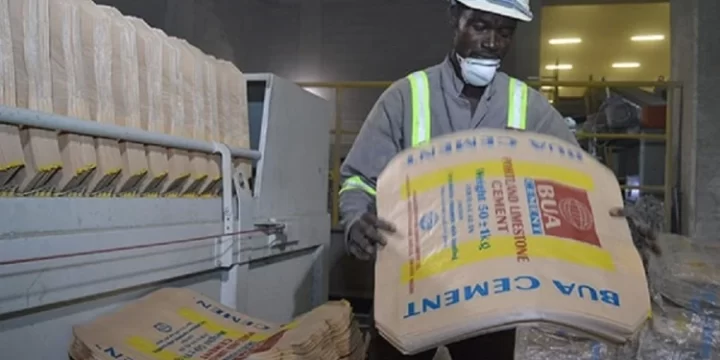BUA Cement Plc has reported a remarkable profit of N289.9 billion for the nine-month period ended September 2025, representing a significant leap in its earnings and reinforcing its position as one of Nigeria’s most profitable manufacturing firms. The strong performance is attributed to improved operational efficiency, increased production capacity, and a sustained rise in domestic demand for cement, particularly from the infrastructure and construction sectors.
According to the company’s latest unaudited financial statement released to the Nigerian Exchange (NGX), revenue surged considerably on the back of higher sales volumes and strategic pricing adjustments that helped cushion the impact of inflation and rising energy costs. The report shows that BUA Cement’s revenue rose by more than 45 percent year-on-year, driven by robust market penetration across the country and a growing customer base in both retail and bulk cement categories.

The company’s management, led by Chairman Abdul Samad Rabiu, said the performance reflects BUA Cement’s resilience amid challenging economic conditions, including fluctuating foreign exchange rates and increased input costs. He noted that the company’s continuous investment in capacity expansion and energy efficiency has played a vital role in sustaining profitability.
Rabiu stated that BUA Cement remains committed to ensuring the availability of high-quality cement across all regions of Nigeria while maintaining competitive prices. “Our goal has always been to make cement affordable and accessible, thereby supporting national development and infrastructure growth. This performance is a testament to our efficient management practices and long-term strategic investments,” he said.
He further disclosed that the company’s energy optimization projects have started yielding tangible results. The use of alternative fuels and the completion of new power plants at its Obu and Sokoto factories have significantly reduced production costs and improved sustainability. The chairman also reaffirmed the company’s plan to complete its new 3 million metric tonne per annum (MTPA) plant in Adamawa State, which is expected to come onstream in 2026.
The Managing Director and Chief Executive Officer, Yusuf Binji, highlighted that BUA Cement has continued to strengthen its distribution network nationwide. “We have expanded our logistics and supply chain operations to ensure our products reach even the most remote parts of Nigeria. This has enhanced customer satisfaction and improved our delivery turnaround time,” he said.
He explained that the company’s focus on innovation and local sourcing of materials has also contributed to its resilience in the face of economic volatility. “We have been deliberate about increasing local input in our production processes. This reduces our exposure to foreign exchange fluctuations and reinforces our commitment to the Nigerian economy,” Binji added.
Financial analysts have described BUA Cement’s performance as a reflection of the positive fundamentals of the Nigerian construction industry, which continues to grow despite macroeconomic headwinds. They noted that government spending on housing, roads, and infrastructure under the 2025 budget has boosted cement consumption, benefiting major players in the industry.
Analysts from CardinalStone Partners observed that the company’s strong balance sheet, low debt profile, and efficient cost management have positioned it well for future growth. “BUA Cement’s capacity expansion plans and operational efficiency provide it with a strong competitive advantage. As infrastructure projects continue across Nigeria, the company is expected to maintain its upward earnings trajectory,” the analysts stated.
The report also noted that BUA Cement’s earnings per share (EPS) increased significantly compared to the same period last year, reflecting higher returns for shareholders. The company reaffirmed its commitment to rewarding investors through consistent dividend payments and long-term value creation.
Meanwhile, the cement manufacturer continues to invest in corporate social responsibility (CSR) initiatives across its host communities. Projects in education, healthcare, water supply, and youth empowerment have been executed in Edo and Sokoto States as part of its efforts to enhance social welfare and economic development.
In addition to its strong financials, BUA Cement has been recognized for its sustainability efforts. The company has made considerable progress in reducing carbon emissions and improving energy efficiency in line with global best practices. Its recent participation in the United Nations Global Compact highlights its commitment to responsible environmental, social, and governance (ESG) practices.
Industry observers say BUA Cement’s performance underlines the competitiveness of Nigeria’s cement sector, which is dominated by three major players — Dangote Cement, Lafarge Africa, and BUA Cement. Collectively, these firms account for more than 90 percent of total cement output in the country, and their expansion activities continue to support Nigeria’s infrastructure drive.
Despite economic headwinds, BUA Cement’s outlook remains positive. With ongoing expansion projects, the company aims to increase its total installed capacity beyond 17 million MTPA by 2026, making it one of the largest producers in Africa. This growth ambition aligns with Nigeria’s infrastructure development goals and the broader African Continental Free Trade Area (AfCFTA) framework, which aims to boost regional trade and industrialization.
As the company continues to execute its growth strategy, it is expected to remain a major contributor to Nigeria’s manufacturing sector and a key player in Africa’s cement industry. With strong leadership, prudent cost management, and sustained investment in capacity, BUA Cement’s impressive N289.9 billion profit underscores its dominance and resilience in Nigeria’s evolving economic landscape.
Support InfoStride News' Credible Journalism: Only credible journalism can guarantee a fair, accountable and transparent society, including democracy and government. It involves a lot of efforts and money. We need your support. Click here to Donate
